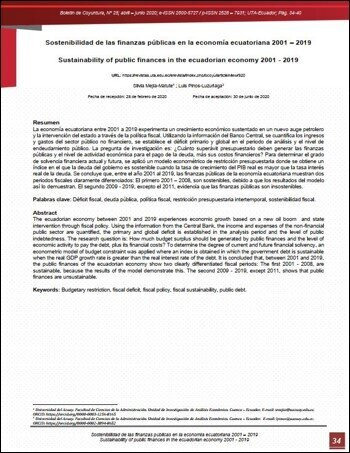Sustainability of public finances in the ecuadorian economy 2001 - 2019
Main Article Content
Abstract
The Ecuadorian economy between 2001 and 2019 experiences economic growth based on a new oil boom and state intervention through fiscal policy. Using the information from the Central Bank, the income and expenses of the non-financial public sector are quantified, the primary and global deficit is established in the analysis period and the level of public indebtedness. The research question is: How much budget surplus should be generated by public finances and the level of economic activity to pay the debt, plus its financial costs? To determine the degree of current and future financial solvency, an econometric model of budget constraint was applied where an index is obtained in which the government debt is sustainable when the real GDP growth rate is greater than the real interest rate of the debt. It is concluded that, between 2001 and 2019, the public finances of the Ecuadorian economy show two clearly differentiated fiscal periods: The first 2001 - 2008, are sustainable, because the results of the model demonstrate this. The second 2009 - 2019, except 2011, shows that public finances are unsustainable.
URL: https://revistas.uta.edu.ec/erevista/index.php/bcoyu/article/view/920
Downloads
Article Details

This work is licensed under a Creative Commons Attribution-NonCommercial 4.0 International License.
![]()
The publications of the Boletín de Coyuntura are licensed under a Creative Commons Attribution-NonCommercial 4.0 International License (CC BY-NC 4.0). The Universidad Técnica de Ambato retains the copyright of the published works, and favors and allows the reuse of these, as long as: the authorship and original source of publication is cited, and they are not used for commercial or onerous purposes. The intellectual property of the published articles belongs to the authors.
References
Asamblea Nacional del Ecuador. (2010). Código Orgánico de Planificación y Finanzas Públicas. Quito: Asamblea Nacional .
Báez Melián, J. (2018). Los Efectos de la Política Fiscal sobre la Desigualdad. Revista de Economía Mundial, 127-148.
Banco Central del Ecuador. (Noviembre de 2019). Banco Central del Ecuador. Obtenido de Banco Central del Ecuador: https://www.bce.fin.ec/index.php/informacioneconomica/
Beckman, T. (2018). Reversing Course: Fiscal Policy and Economic Interdependence. Taylor & Francis Ltd., United Kingdom: Taylor & Francis Ltd. doi:DOI:10.1080/03050629.2018.1434169
Blanchard, O., & Amighini, A. &. (2012). Macroeconomía. Madrid: Pearson.
Blanchard, O., Amighini, A., & Giavazzi, F. (2012). Macroeconomía. Madrid: Pearson.
Céspedes Rangel, E. (2009). La Sostenibilidad de la Política Fiscal de Bogotá 2008 - 2020. Cuadernos de Economía, 63-94.
Chaves, Á. H. (2003). La Restricción Intertemporal del Presupuesto. Una Evaluación Empírica para el Gobierno Nacional Central de Colombia. 1950-2010. Cuaderno de Economía(39), 99-128.
Echenique Romero, X. (2016). La construcción de una política tributaria. Economía Informa(398), 75-88.
Fierro-Renoy, V. (2017). Sostenibilidad de las Finanzas Públicas Ecuatorianas y Patrimonio Público, 1972-2015. Polemika 12, 9-65.
Gogas, P., & Pragidis, I. (2015). Are there asymmetries in fiscal policy shocks? doi:DOI:10.1108/JES-04-2013-0059
Hernández Mota, J. L. (2013). Reinventando la Política Fiscal: ¿Una nueva estrategia para la estabilización y el crecimiento económico. Cuadernos de Economía, 33-59.
Jimenez, F. (2017). Macroeconomía. Enfoques y Modelos. Lima: Macro.
Jorrat, M. (2011). Evaluando la equidad horizontal y vertical en el impuesto al valor agregado y el impuesto a la renta: el impacto de reformas tributarias potenciales. Los casos de Ecuador, Guatemala y Paraguay. Santiago de Chile: Publicación de las Naciones Unidas. Obtenido de https://repositorio.cepal.org/bitstream/handle/11362/5345/S1100385_es.pdf?sequence=1&isAllowed=y
Koh, W. C. (2017). Oil price shocks and macroeconomic adjustments in oil-exporting countries. International Economics and Economic Policy, 187-210. doi:http://dx.doi.org/10.1007/s10368-015-0333-z
Larraín, F., & Sachs, J. (2013). Macroeconomía en la Eonomía Global. Santiago de Chile: Pearson.
León Sánchez, F. X., & Morales Castro, S. (2018). Technical methodological tools for learning tax incentives in the economic growth of Ecuador in the period (2007 - 2012). Dilemas Contemporáneos: Educación, Política y Valore, 1-28.
Ministerio de Finanzas Ecuador. (2010). Código Orgánico de Planificación Finanzas Públicas. Quito.
Mochón, F. (2009). Introducción a la macroeconomía. S.A. MCGRAW-HILL / INTERAMERICANA DE ESPAÑA.
OCDE/CEPAL/CIAT/BID. (2017). Estadísticas tributarias en América Latina y el Caribe 1990-2015. Paris: OECD Publishing. Recuperado el 2018, de http://dx.doi.org/10.1787/rev_lat_car-2017-en-fr
Rangel, E. C. (2008). La Sostenibilidad de la Pol+itica Fiscal de Bogotá.
Ricardo, D. (1817). Principios de Economía Política y Tributación. Ediciones Pirámide.
Soto, F. J. (2010). Hacienda Pública I. Madrid.


